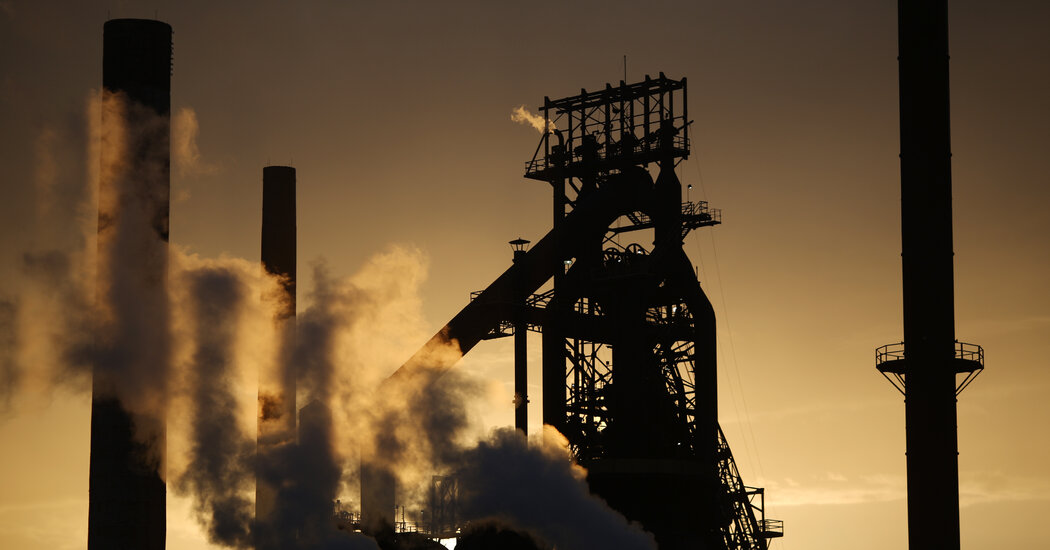A new initiative aims to reduce emissions from steel, cement, aluminum and other materials used in the industrial sector, which generates about a third of the nation’s greenhouse gases.
WASHINGTON — The Biden administration on Tuesday will set out a strategy for buying “clean,” lower-emissions steel, cement, aluminum and other industrial materials for federal agencies and projects, part of its effort to reduce carbon emissions from industrial manufacturing.
The industrial sector is responsible for about one-third of the greenhouse gases produced by the United States — pollution that is helping to heat the planet to dangerous levels. White House officials said they would use federal purchasing power to encourage the industrial sector to develop low-carbon alternatives.
A new Buy Clean Task Force will be created to ensure federal agencies buy construction materials that are manufactured in a way that produces fewer emissions. The Energy Department will spend $9.5 billion to encourage the commercial-scale development of clean hydrogen, a zero-carbon alternative to natural gas that is currently expensive and complicated to produce. The White House on Tuesday will also issue new guidance on deploying technology that can capture pollution from sources like smokestacks or from the air and then permanently store it.
“Focusing on industry is a really big deal,” David M. Hart, a public policy professor at George Mason University in Virginia, said. He said the federal government for years had “neglected” to address climate pollution from the industrial sector, as there was no single agency responsible for prodding manufacturers of steel, aluminum, cement and concrete to cut their emissions.
The Biden Administration’s Environmental Agenda
President Biden is pushing stronger regulations, but faces a narrow path to achieving his goals in the fight against global warming.
- Mounting Challenges: The next few months will be critical for the president’s environmental agenda. Can he live up to his promises?
- Climate Action: Some Democrats in Congress are hoping to salvage the climate portion of President Biden’s Build Back Better Act, which has stalled in Congress.
- Air Pollution: The administration recently restored regulations on the release of mercury, a neurotoxin linked to developmental damage in children, from coal-burning power plants.
- Wastewater Projects: The infrastructure bill includes funding to upgrade sewer and drainage systems. Will the money go where it’s most needed?
- Taming Wildfires: A plan by the administration to reduce the danger of fires is aiming to make forests more resilient through thinning and intentional burning.
“It’s an important step forward,” Mr. Hart said of the new policies.
President Biden has made tackling climate change a top priority; he has pledged to cut the country’s emissions nearly in half from 2005 levels by the end of this decade. But his most important tool — billions of dollars in tax incentives to stimulate wind and solar energy and to speed the adoption of electric cars — is stalled in Congress. Later this year, the Supreme Court might restrict the government’s ability to regulate emissions in the power sector. And on Friday, a federal judge blocked the administration from using a tool to calculate the impact of climate change in creating federal rules.
Michael Greenstone, an economist at the University of Chicago, called the new policy moves targeting industrial emissions “bite-sized” — but said they were necessary in the absence of action from Congress.
“The country is now in a position where it must pursue climate change on a very thin reed,” Mr. Greenstone said.
But the Biden administration has run into problems trying to tackle climate change, even when it has the authority to do so. For example, the president has ordered federal agencies to phase out the purchase of gasoline-powered vehicles by 2035, but the United States Postal Service, an independent agency run by a board of governors, is defying that order by moving forward with the purchase of about 165,000 gas-powered trucks.
A senior administration official said on Monday that discussions about the purchase were continuing between the White House and the U.S. Postal Service.
The federal government is the largest consumer in the world, spending more than $650 billion on products and services annually. According to a White House fact sheet, the Buy Clean Task Force will prioritize products and pollutants, help manufacturers better report emissions data and set up pilot projects to increase federal procurement of clean construction materials.
The American Institute of Steel and Construction, a trade group, could not be reached for comment on Monday.
Industrial emissions are on track to be the biggest source of climate pollution in the United States by the end of this decade, said Sasha Stashwick, a senior adviser with the Natural Resources Defense Council, an environmental group.
“If we don’t find ways to deeply decarbonize the sector, we can’t achieve our North Star climate goals,” she said.


























